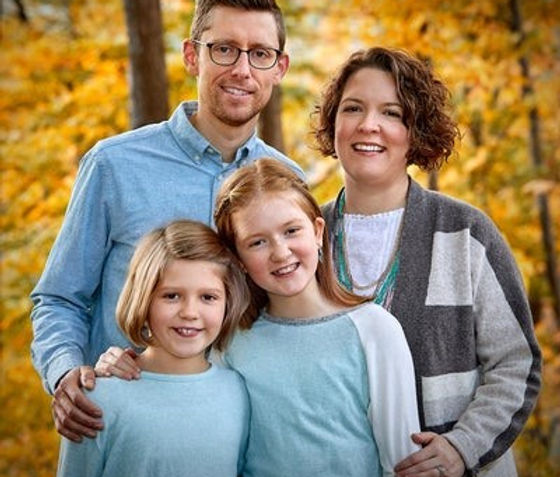Chatting with Gillian Doucet Campbell, MA, CFRE, Director of Stewardship and Development with the Anglican Diocese of Niagara was such a treat, and I think you will really enjoy reading about balance from her perspective.
I’ve had the good fortune of volunteering with Gillian with the AFP Golden Horseshoe Board of Directors for several years now, and her calm demeanor and warm presence always makes me feel like she has a great handle on her life and all of her volunteer and family commitments.
With two busy daughters, and many volunteer commitments (including AFP Golden Horseshoe, St. John the Evangelist, Stewardship Committee Member, and a Library volunteer at her children’s school).
 1. So, what does a day in the life of Gillian Doucet Campbell, Director of Stewardship & Development, Anglican Diocese of Niagara look like?
1. So, what does a day in the life of Gillian Doucet Campbell, Director of Stewardship & Development, Anglican Diocese of Niagara look like?
Every day is different – and that’s why I enjoy this role. Most days start at 7:30 am for me – yup, I sleep in. And best of all, I usually wake-up to a cup of coffee waiting for me from Steve, my partner. The children are pretty much able to get themselves ready and need only to be reminded of the time to hurry them up and to check in that they had a glass of water with their breakfast.
My dad usually drives the children to school, so I arrive to work by 9:00 am. Or if I worked the evening prior or the Saturday or Sunday as I sometimes need to, I may go in late so that I can catch up on some house things, like cleaning or laundry.
Depending on the day I may have a meeting at a parish in our Diocese to help with their fund development. The geographical region is not too large, so I can be at most any parish within 45 minutes.
At my office, which is located downtown Hamilton, a 20-minute drive from home, I work with a great group of people. It’s a terrific vibe here. One thing that I have come to really appreciate is that several of the departments eat lunch together each day. On Fridays we generally all go out for lunch together too. This is great for staff morale and to support the many local restaurants along James St. N.
Another opportunity in working with the Anglican Diocese of Niagara, and being Anglican myself, is that each Wednesday we have a time for worship together followed by a social gathering. All departments participate as people feel comfortable. It really is a great way to build community and to be mindful of why we do the work we do.
My workday ends around 5:00 p.m. Some days we rush out to get someone to an activity or some days supper is late because of an extra curricular activity. But always we eat together as a family.
Depending on the evening we may play a board game together or go for a walk. The children start to get ready for bed around 8:00 p.m. and lights are out by 9:00 p.m. It doesn’t take them an hour to get ready – this includes reading time. They sometimes read on their own or Steve or I read to them.
Then Steve and I usually finish tidying up and then we may read or watch a show – often while folding laundry. Generally, I’m fast asleep by 10:45 p.m.
2. Your children are verging on that age of more independence, but I know you are still busy with extra curricular’s, etc., so how do you find balance? Or I guess the real question is, do you think this balance is possible?
Up front I must admit that I am very fortunate for two reasons when it comes to work/life balance. One, my partner Steve bucks the trend in support – he really is present, takes initiative around the house, and we make a great team. I can take bigger risks because of his support and would not be where I am today if it weren’t for his support.
Two, my parents live with us and this is a real gift. Sometimes I don’t like to share this because it feels like I’m bragging. I know that having your parents or in-laws live with you may not be for everyone, but it works so well for us.
My parents have lived with us for almost 3 years now. They have their own apartment in our home. Before this, they lived in New Brunswick and my in-laws live in Manitoba, so work/life balance was a struggle and we depended on the kindness of our church family, friends, and great employers.
My parents make mine, Steve’s and our children’s life so much easier. For instance, my dad drives the children to school and picks them up, so they don’t need to go to aftercare which saves money. My parents make sure the children do their homework, get a snack, practice their instrument – whatever needs to be done before Steve and I get home. They will also drive them to extra curricular’s, birthday parties, etc. when Steve and I are not able to.
It also means that I can more easily say “yes” to going to a conference or when Steve and I are both out at meetings in the evening someone is home with the children and things will get done – like emptying or re-loading the dishwasher and lunches made. It makes committing to events and meetings easier. It also means that PD days or when a child is sick, we don’t need to scramble or pay extra for care.
So overall, the mental load is less, the scheduling is easier, and the balance between home and work is more than manageable. So really, I think the balance is possible – when you have an amazing support system.
3. You’ve shared with me that you have a hard rule in your house about family dinners and the importance of using that time to connect. Can you tell me a bit more about that and how this helps you maintain balance/connection with your family?
Part of the rule around family dinners is selfishly motivated – I don’t want to be a chauffeur and I want to eat a good meal. So, we limit the after-school activities that our children are involved in. When I’m booking their activities, I work hard at ensuring we’ll get to have dinner together. Also, dinner time is flexible – some days we eat together at 5:00 pm and some days at 7:00 pm. During this time, we hear about the ups and downs of the day from each other, including our Homestay Student from China who’s in grade 11.
We also plan for the next day and discuss any upcoming events or activities. It’s just a great way to be able to check in and get the temperature for what’s going on for the kids and the kids get to hear about what Steve and I are up to.
It also provides a place to make decisions together, like what we’ll do on a family vacation or when we made the choice to have 3 vegetarian meals a week. Everyone’s input matters.
4. Tell me more about your volunteerism and how this fuels your passion for the sector? Do you involve your daughters in your volunteerism at all?
I don’t have hobbies – or at least I joke that I don’t. It’s because most of my leisure time is tied into my skill set and workplace – fundraising and the Anglican church. A few years ago, I loved volunteering using these skills and abilities. Even with my role on the AFP Golden Horseshoe Board I started as Every Member Campaign and Scholarship and Bursary Chair.
Within my new role with the Anglican Diocese of Niagara, where I’m more like a consultant for over 80 parishes and several ministries of the Anglican Diocese of Niagara, I would rather take on a different role than volunteering with fund development. So, now I’m the co-chair of Education on AFP GH and volunteer at my children’s school in the library re-stocking shelves and reading to children. These are more life-giving now.
My children and I have attended a few social justice rallies. Recently we attended the Climate Strike and have been to rallies to support women’s rights. I think it’s important to engage children in activism and include them in civil society. Absolutely some of the issues are hard and can be frightening, but I think that’s why it’s even more important to talk about the world around us in an age appropriate way that provides room for hope.
My children are also keen to support causes they care about. A couple years ago and now again this year they are making Christmas cards to raise money. The first year they raised over $200 for UNHCR because they wanted to help Refugee children living in tents – they were very clear. This year they have a goal of raising $350 to either help build a well or support education overseas – they’re still deciding and looking at organizations and their impact. What was remarkable is that they came up with this idea themselves, set a goal, and even created a brand, “Love Comes from the Heart”. It certainly makes this Mama’s heart swell with pride.
5. You’ve worked in several different areas of the social profit sectors (education, faith-based), have you noticed a difference in cultures and how these different areas promote or value work-life balance?
Faith based or not it really is the employer that creates the culture around work-life balance. In one role I had colleagues who were like punch-clocks – if you came in at 8:45 am instead of 8:30 am you felt judged – even if you were at a work event the evening before, there was no grace, only suspicion. This was due to the tone set by management though. Not a great culture to be in as it lacked trust.
In another role the Director of the department understood that an employee who is invested in and valued will work hard – even if they must miss a day of work due to a sick child or come in 15 minutes late. With this trust you bet I worked hard – and more than the 8-hour day or role required – because of the trust she gave me.
6. What advice can you offer to those women just starting to build their career and their families?
Some advice I wish I had received or had listened to:
- Give help and accept help – the whole “It takes a village” thing is true.
- Know your worth when it comes to salary. Do the research and don’t settle for less – in fact, aim high. Something I have often said is, if my work is going to take me away from time with my family, then I better enjoy it and I better be valued for it.
- Your career is a marathon, not a sprint. To move up you must sometimes move laterally or even down to get to where you want to go – so, as Stephen Covey said, “Begin with the end in mind”.
- Mentoring is important – be a mentor and have mentors. Throughout my almost 10-year career as a fundraiser I’ve had the freedom to own my schedule and have access to leadership – except in one role which really took a toll on me. Overall, I have benefited from the encouragement, advice and solidarity of more senior colleagues. I consider it a responsibility to do the same for younger colleagues and potential colleagues.
- I strongly recommend membership with your local AFP chapter. I’m grateful for AFP Golden Horseshoe. I would not have had the opportunities I’ve come across without this group.
7. In your opinion, what are the top 3 things our sector needs to do to help women as leaders?
While women dominate in the Social Profit Sector there is still a large gap when it comes to female leadership and equal pay. The research shows that in non-profit organizations the richer an organization is, the less gender diversity there is in leadership. We also see that when women do lead larger non-profits their pay is markedly lower than their male peers. It should seem rather ironic when much of the work of the social profit sector is justice, equality, and improving and restoring individuals and communities. Organizations need to look at their pay structures and make changes. One way to do this is make salary ranges accessible and to post salary ranges when hiring.
Things we can do in our sector to support women in and moving towards leadership include encouraging women to lead – men and women must support women moving towards and in leadership. This includes words of affirmation, constructive criticism based on something that can be acted on and improved, meaningful opportunities to lead provided at all levels of the organization, professional development, promotion of younger women to roles of leadership including Boards, and to participate in mentoring. And just as the for-profit sector moves towards trying to diversify boards – both in gender and ethnicity – we too need to look for board members and leaders who don’t just remind us of ourselves.
We also need progressive family and mental health policies that improve employee connection, productivity and retention. These policies must not only be created but strongly endorsed by leadership and utilized by all employees. No one should be thought less of for utilizing progressive family and mental health policies.
8. What is on your current reading list?
I am a collector of books and so have a bedside table and shelf loaded with books to read. I think this is because I love learning all that I can about fundraising as well as the spiritual practice of stewardship. I’m currently reading, “Just Giving: Philanthropy Is Failing Democracy & How It Can Do Better”, by, Rob Reich and “How the Bible Actually Works”, by Peter Enns. I’m also reading, “Jane of Lantern Hill” by Lucy Maude Montgomery to my children.
9. And lastly, when you do manage to find a few moments for yourself, what is your go to self-care activity?
When I have time to myself, I enjoy watching a light murder mystery – anything from “Father Brown” to “Agatha Raisin”, with a glass of wine of course. I also see a Spiritual Director once a month. Her home office is on a lovely farm about 45 minutes away in wine country. I intentionally chose her due to the lovely drive where I can play some good music, take the side roads and enjoy the scenery. The time with her helps me to relax, reflect, and center myself in relation to God – something that as a parent involved in work that is also deeply personal, doesn’t always come easy.
I’m so grateful Gillian took the time to chat with me and share her perspective, I think she brought a different lens to this balance discussion, one hopefully some of you can resonate with!
I LOVED the fact that her work in this sector, and the example she has set, has motivated her children to do some great charitable work themselves. As parents working in the social profit sector, I truly believe engaging our children in the important work we do will help build our communities and our sector for generations to come.
Feel free to reach out to Gillian if you have any questions or want to chat with her. As she said, it takes a village!




